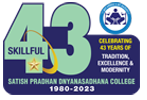
Dnyanasadhana, Thane Society's
Satish Pradhan Dnyanasadhana College, Thane
(Arts, Science and Commerce)
Re-Accredited "B+" Grade (CGPA 2.69) by NAAC, ISO 21001:2018 (Certified)
Affiliated To University of Mumbai

Research Promotion Cell
Introduction
A Research Promotion Policy (RPP) is designed to foster a culture of research among faculties, staff, and students. This policy outlines the framework, incentives, and support mechanisms to encourage scholarly activities and contribute to academic and societal advancements.
1. Objectives
Enhance Research Culture: Promote a research-oriented mindset among faculty and students.
Encourage Publications: Support faculty in publishing their research in peer-reviewed journals.
Interdisciplinary Research: Encourage collaboration across various disciplines.
Link Research to Teaching: Integrate research activities with teaching practices to enrich the academic environment.
Societal Impact: Focus on research that addresses societal issues and contributes to community development.
2. Eligibility
Faculty Members: Permanent and temporary faculty members are eligible to participate in research activities.
Students: Undergraduate and postgraduate students can participate in research projects under the guidance of faculty members.
Collaborators: The policy may also cover collaboration with external researchers and institutions.
3. Research Grants and Funding
Internal Funding: Provision for seed funding for new research projects.
External Funding: Guidance and support for securing grants from national and international funding agencies.
Financial assistance: It is provided for presenting research work at conferences, workshops, and seminars and also for availing life memberships.
4. Research Infrastructure
Laboratories and Equipment: Providing state-of-the-art research facilities and laboratories.
Library Resources: Access to online journals, databases, and other research materials.
Research Centers: Establishing specialized centers or institutes focused on key research areas.
5.Plagiarism Policy
Implementing strict measures against plagiarism and ensuring the originality of research.
6. Capacity Building
Workshops and Seminars: Regular workshops and seminars on research methodologies, writing research proposals, and data analysis.
Faculty Development Programs: Training programs to enhance the research skills of faculty members.
Student Research Training: Programs to equip students with research skills and knowledge.
7. Collaboration and Partnerships
MoUs with Institutions: Establishing Memoranda of Understanding (MoUs) with other universities and research institutions.
Industry Collaboration: Partnering with industry for research projects that have commercial applications.
International Collaboration: Encouraging cross-border research partnerships and exchanges.
8. Monitoring and Evaluation
Research Committee: A dedicated committee to oversee research activities, monitor progress, and evaluate outcomes.
Annual Reports: Submission of annual research reports by faculty and research centers.
Review Mechanism: Regular review and update of the Research Promotion Policy to align with current trends and challenges in the academic field.
9. Outreach and Dissemination
Research Publications: Encouraging faculty and students to publish their research findings in reputable journals and present at conferences.
Community Engagement: Projects that directly benefit the local community or address regional issues.
Research Communication: Strategies for communicating research findings to a broader audience, including the media and the public.
10. Dnyanakosh – College Research Journal
Journal Management: Develop clear guidelines for manuscript submission, peer review, and publication processes.
Promotion: Promote the journal to increase its visibility and attract quality research submissions.
11. Participation in Avishkar
Preparation Support: Guide students in preparing their research for the Avishkar convention.
Application Assistance: Help students with the application and submission processes for participation in Avishkar.
